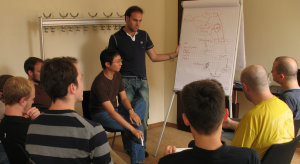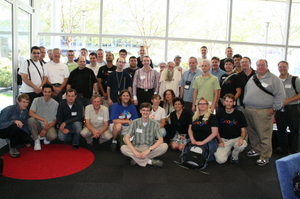
Mark Shuttleworth leading a session on improving the bug-tracker
At the ACHAT hotel in Wiesbaden, central Germany, twenty-three members of the Ubuntu development team have managed to get together for a small, fast-paced development conference known as a ‘sprint’.
The idea behind a sprint is to get as many of the right people in one place at once, for a concentrated week-long session. Time is divided between resolving issues in a face-to-face manner, planning how to manage the direction of future of work and down to earth actual development.
Behind the bug-fixing, a lot of developers are taking the opportunity to hack away on features for the next release of Ubuntu, currently under development with the codename “edgy eft” and due for final release in October 2006.
One of the successful advantages of Ubuntu is the distribution of Ubuntu developers across several countries and timezones around the world. There’s always somebody awake in Ubuntuland!
Because of being spread out, developers and Ubunteros mainly communicate online, via email, IRC chat and other forums. Even talking to the Ubuntu developers electronically every day, it’s often possible to only remember their online nickname—often a strange name, such as ‘keybuk’, ‘doko’, ‘kamion’ or ‘seb128‘—rather than their real names.
If you’ve seen reports, or been luckily enough to attend, one of the main Ubuntu Summits held at the start of each new release cycle, then this is different. The development team, managed by Matt Zimmerman are increasingly working as an tightly knit autonomous unit, concentrating on just getting work on Ubuntu done (to the extent that the unreliable hotel internet connection will allow…).
One of the noticable differences between a main Ubuntu conference and this sprint is that Ubuntu founder, Mark Shuttleworth, has only been at the hotel for two days during the whole five-day week.
SABDFL (aka Mark) tends to move around parts of Canonical and the Ubuntu project. There is a focus on getting each team up to speed and then allowing the group to continue to accelerate under its own momentum. However leadership, presence and guidance can be welcome from time to time.
On Wednesday night, the whole team in Wiesbaden stayed up working through an incident late into the night along with members of the Canonical team back in London and Canada. Everyone kept hacking away at their laptops, helping to ensure that after a problem with an update for the 6.06 LTS release, everyone’s machines kept on running!
If you have had problems with your Xorg (video driver) between Monday or Tuesday, be sure to check the notice above.


